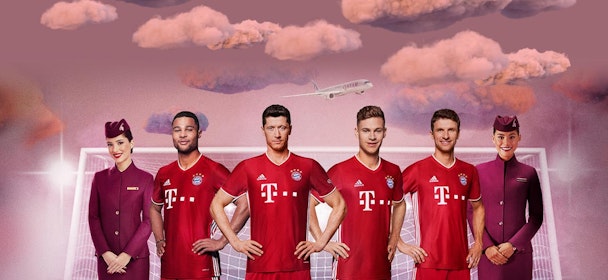Is that partnership worth more than your reputation and your fanbase?
After recent controversies involving Mercedes F1 and Bayern Munich sponsorships, sports marketer Amar Singh warns teams to think carefully about their fans before striking any new brand partnerships.

A promotional image from the Qatar Airways-Bayern partnership, which has angered many of the club's fans
When Mercedes performed a U-turn last week on its Formula One partnership with controversial building materials firm Kingspan, it came as no surprise.
For five days the Championship-chasing team had faced condemnations from bereaved families of the Grenfell Tower fire, dismayed fans and the communities secretary Michael Gove.
A partnership, ratified with the intention of demonstrating its credentials in developing sustainability initiatives, spectacularly backfired for Mercedes, whose team boss Toto Wolff has pledged to meet survivors of the west London tragedy after apologising for any distress caused by the deal.
As anyone who has followed the Grenfell Inquiry – even intermittently – can tell you, Kingspan’s materials constituted a small percentage of the insulation on the tower block which went up in flames in June 2017, leading to the deaths of 72 people.
The Irish organization says it supports the work of the ongoing Grenfell Inquiry and strongly denies malpractice, but it is one of three companies accused of “widespread and persistent wrongdoing” leading to combustible cladding being fitted on the tower block.
For Mercedes, the second most valuable team in F1, with one of the UK’s most high-profile sports people in its ranks in Lewis Hamilton, to partner with Kingspan – a firm which has loomed large in the inquiry – it’s hard to imagine a worst-conceived partnership.
To go even further, Hamilton is not just a leading British sportsman but the sport’s only Black driver.
A vocal supporter of diversity and equality, taking the knee before each Grand Prix, the seven-time world champion has also used previously his social channels' platform to support the Justice for Grenfell campaign.
The inextricable link between racial inequality and the tragedy of Grenfell makes it even more alarming that someone at Mercedes would think a partnership with Kingspan was a good idea.
Yet Mercedes is not the only organization that gets involved with the worst possible partner only to wash their hands of it the moment things get toxic.
Time and time again, we see organizations in sport put financial targets ahead of deploying the necessary checks and balances when selecting their partners, leading to rancour, controversy and backtracking.
In Germany, an acrimonious debate rages around the Bundesliga’s most successful club, Bayern Munich – and a growing section of its fanbase – over the club’s links with Qatar.
The oil-rich state has successfully lobbied its way into the center of the sporting universe and this will culminate with it hosting next year’s Fifa World Cup.
Yet Qatar has a poor record on human rights from the treatment of migrant workers to its anti-homosexuality laws.
This puts sport’s emerging giant at odds immediately with a post-pandemic world in which consumers – and fans – demand to know how the clubs they follow are using their power, platform and profits to help make it a better place.
According to data from MKTG Sport + Entertainment’s upcoming global fan survey, Decoding, 66% of fans say they are more likely to support a company that supports equality.
At Bayern this particular type of frisson culminated at the club’s AGM, with irate supporters jeering the club’s directors and declaring, "We are Bayern! You are not!"
But the unedifying spectacle was not just limited to a midweek meeting described by honorary club president Uli Hoeness as the worst he had ever attended.
Fans followed up at a televised match unfurling a huge banner depicting the club’s chief executive Oliver Kahn and chairman Herbert Hainer with the slogan “We wash everything white for money”.
With Bayern flying high at the top of the Bundesliga and through to the last 16 of the Uefa Champions League, positive sentiments around the team have been overshadowed by righteous outrage around this lucrative deal.
Similarly, in September, the Arsenal Supporters Trust accused the club of ‘losing its moral compass’, after Arsenal renewed a sponsorship deal with the tourism board of Rwanda – a country ruled by a regime accused of ‘arbitrary detention, ill-treatment, and torture’ by Human Rights Watch.
The last month has seen both FC Barcelona and Manchester City hastily terminate crypto-related sponsorship deals over ambiguities and irregularities, while in cricket, a plethora of sponsors abandoned Yorkshire County Cricket Club after an unprecedented race crisis.
Getting money through the door is vital for any sporting body, particularly after revenue streams were curtailed by the pandemic.
But the reputational damage that can come from partnering with an organization that puts you at odds with your fans, athletes or brand values could end up costing you much more than the value of the partnership.
Amar Singh is head of content and comms for MKTG Sport + Entertainment.
